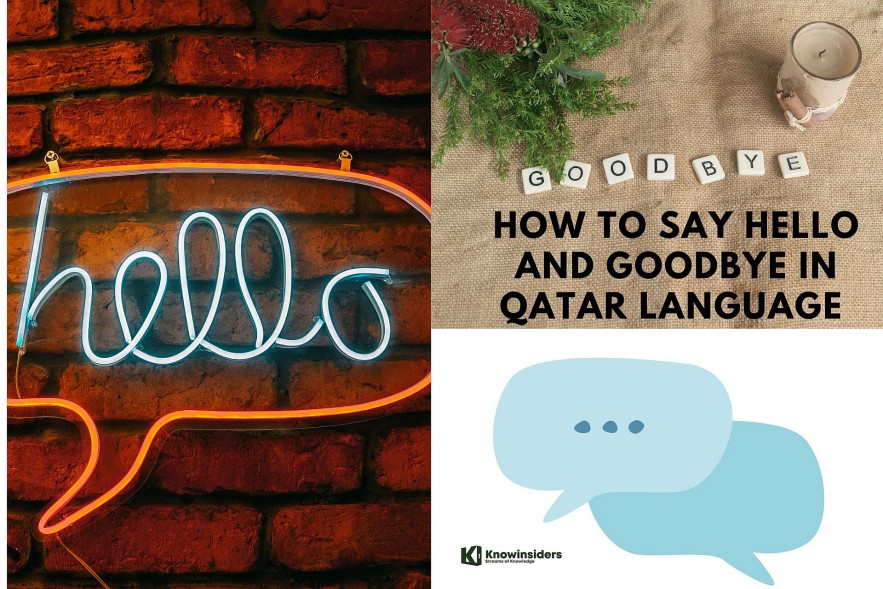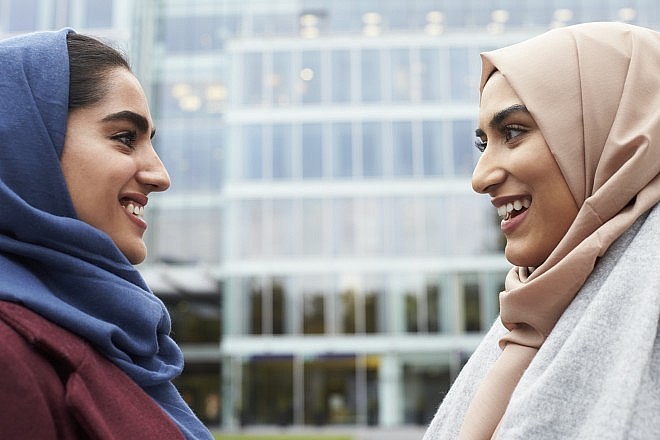How To Say Hello and Goodbye In Qatar Language
 |
| How To Say Hello and Goodbye In Qatar Language. Photo KnowInsiders |
You’re visiting Qatar and you want to talk the talk and walk the walk. Having a little bit of Arabic under your belt is a great way to do that. You’ll especially want to know some of the key phrases when you experience the famous “Arab hospitality”.
What language is spoken in Qatar?
Despite being one of the richest countries in the world, Qatar has a relatively small population, with only 2.5 million inhabitants of which fewer than 12% are local Qataris. And, although Arabic is the official language of the State, you may also hear other languages such as Farsi, Urdu, Malayalam or Tagalog while in Qatar, sometimes all of them in one day!
How to Say "Hello" in Arabic
 |
| Photo iloveQatar |
1. Use "as-salaam 'alaykum" as a default greeting
The greeting "as-salaam 'alaykum" literally means "peace be upon you," and is a traditional greeting among Muslims. Because the majority of Arabs are Muslims, it is also the most common Arabic greeting.
The response to this greeting is "wa 'alaykum as-salaam," which essentially means "and also with you."
If you are in an Arabic country, this is a good default greeting whether you know the religious beliefs of the person you're greeting or not. Outside Arabic countries, however, you may want to use a different greeting if you know the person you're greeting is not Muslim.
2. Switch to "ahlan" if you aren't comfortable with religious greetings
"Ahlan" is the basic way to say "hello" in Arabic, and is suitable for all occasions. If you're not Muslim or don't feel comfortable giving a Muslim greeting, you can use this instead.
"Ahlan wa sahlan" is the more formal version of "ahlan." Use this with people older than you or in a position of authority.
The response to "ahlan" is "ahlan bik" (if you are male) or "ahlan biki" (if you are female). If someone says "ahlan" to you first, remember to adjust your response depending on whether they are male or female.
READ MORE: How to Say 'THANK YOU' in Most Spoken Languages in the World
| Tip: You may hear Arab-speakers using English greetings as well. However, these are considered relatively casual or familiar. Avoid them unless you know the person well or they've used an English greeting with you first. |
3. Alter your greeting based on the time of day
There are also time-specific greetings in Arabic that you can use in the morning, afternoon, or evening. While these aren't as common, you can use them if you feel like it. They're considered relatively formal, so they're appropriate regardless of who you're greeting.
| Sabaah an-noor – This is a common reply to the phrase above, literally meaning ‘Morning of Light’ or ‘Good Morning’. Masaa' al-khayr – This means ‘Good Evening’. Masaa' an-noor - This is a common reply to the phrase above, literally meaning ‘Evening of Light’ or ‘Good Evening’. |
| Tip: The phrase for "good night" is "tusbih alaa khayr." This phrase is typically used as a form of "goodbye" at the end of an evening, however — not as a greeting. |
4. Ask how the person is doing
As in other languages, it's common to ask after someone's welfare immediately after greeting them. In Arabic, the basic question differs depending on whether you're speaking to a man or a woman.
If you're speaking to a man, ask "kayfa haalak?" He will likely respond "ana bekhair, shukran!" (which essentially means "I'm fine, thanks!"
If you're speaking to a woman, ask "kayfa haalik?" The response is typically the same as it would be for a man.
If the other person asks you how you're doing first, respond "ana bekhair, shukran!" and then follow up with "wa ant?" (if the person is a man) or "wa anti?" (if the person is a woman. These phrases essentially mean "and you?"
If you and the person you've greeted don't have any other languages in common and you want to attempt to continue speaking in Arabic, you might let them know that you only know a little Arabic. Say "na'am, qaliilan," to indicate that you only speak a little Arabic.
If you don't understand what the person is saying, you might say "laa afham" (I don't understand).
How to say "Goodbye" in Qatar language
Ma’a as-salaama – This is a way of expressing farewell. It means ‘Goodbye.’
It’s meant to mean something like “may you be accompanied with safety/peace”. It’s the most common way of saying goodbye in Arabic.
The phrase ma’a salama is recognized in most Arab-speaking countries. It is also very versatile and you can use it in most situations, formal and informal.
Ila-liqaa’ – This phrase also expresses farewell but means ‘Until we meet again.’
Bisalama
Bisalama carries the same meaning as ma’a salama. It is used to say goodbye in Tunisia and Morocco.
Bkhatrak
Bkhatrak is used as way to say goodbye in the Levantine Arabic dialect. It means ‘I am leaving with your acceptance’. When addressing a male, you would use بخاطرَك bkhatrak. When addressing a female, you would say بخاطرِك bkhatrek. If the talking to more than one person, you use the term “بخاطركن bkhaterkon”. Note that this is used when you’re leaving someone’s home or someone’s place.
Allah ma’ak
Allah ma’ak is the corollary to bkhatrak. It is also used in Levantine Arabic and is the phrase you use to the person who is leaving your home, work, etc.
Bye and Yala bye
You might recognize this next expression if you’ve spent any time in social situations in the middle east. Bye and yalla bye has been adapted from English.
If you’re learning Arabic, yalla is something you’ll hear often. It simply means “let’s go”. Both bye and yalla bye are very informal ways of saying bye in Arabic. You can use it in casual situations with familiar friends.
Bshofak ba’dan
You can also leave saying the term bshofak ba’dan which means ‘see you later’ when talking to a male, or bshofik ba’dan when talking to a female, or bshofkon ba’dan when talking to more than one person. Certain regions may have variations in saying this. For example, in Egypt, they omit the b, so it is pronounced ashofak baden .
READ MORE: How to Say 'Good Luck' in 40 World's Most Spoken Languages
| Basic conversation 1. Shismik (for male)/ Shismich (for female) = What's your name? 2. Ismii Mohammad = My name is Mohammad 3. Tasharafna = Pleasure to meet you 4. Int min wain? (for male)/ Inti min wain? (for female) = Where are you from? 5. Titkalem ingaleezee (for male)/ Titkalemeen ingaleezee (for female)? = Do you speak English? 6. Anaa laa ata haddath al'ingiliiziyya = I don't speak English 7. Lil'asaf, anaa ata haddath faqat qaliil min alaarabiyya = Unfortunately, I only speak a little Arabic 8. Shlonik (for male)/ Shlonich (for female) = How are you? 9. Ana bikhayr = I'm fine 10. Ana zein = I’m good |
Greeting etiquettes in Qatar
 |
| Photo expatica |
Depending on one’s gender, Qataris have distinct ways of greeting each other. For example, men tend to shake hands (always the right one) as a formal greeting. If you are in an informal environment and you know the person very well, you can kiss each other on the cheek (three times on the right cheek). However, if you meet a relative or a close friend, you can greet each other by touching noses twice. The same procedure can be followed by women when greeting formally. For relatives and close friends, they also kiss on the cheek (three times on the right side) and usually hug too.
However, greeting rules are different between men and women, and the best advice is to wait for the Qatari person to take the lead. Men and women do not normally touch, and while some Qatari women feel comfortable shaking hands with a man, others refrain from doing so. Similarly, men may refrain from extending their hand to women or even sitting beside them. The safest way to know if a woman agrees with shaking hands is to leave a distance and wait for her to extend her hand. If she does, it is okay to greet her by shaking hands. If not, then she may smile, greet verbally, or place her right hand on her heart as a greeting. Similarly, if a woman holds both hands together, it is also a sign that she doesn’t wish to shake them.
When you visit a Qatari home, greet people according to their status and age (the elderly and those that have a higher status must be greeted first, and also the women). If you touch a child on their head, it's also a sign of respect for them and means may God bless the child.
Some people in Qatar prefer not to shake hands with the opposite sex as it is deemed religiously inappropriate, but they may hold their right hand on the heart as a sign of greeting.
Removing the shoes
You may be expected to take off your shoes when you go to a Qatari home because it's part of Qatari traditions, but this varies from home to home. You can keep your socks on, but if you take them off, make sure your feet are clean.
Arabic coffee etiquettes
 |
| Photo Great Escape Holidays |
Arabic coffee (gahwa) is served from a traditional coffee pot known as the ‘dallah’ in a mini delicate cup called the ‘finjaan’- that does not have a handle - and even that is not filled to the top. It should be filled upto 1/4th of the cup, so it isn't too hot when the guest sips it.
The Qatari host will always try the Arabic coffee first to ensure it's good enough to serve the guests. Each guest is served in the same way individually; the coffee is never poured into ‘finjaans’ and served in a tray. The guest must always drink from the right hand.
Do keep in mind that if you hand the 'finjaan' back to the person serving the Arabic coffee, it means you want a refill, and if you don't want any more coffee, you must jiggle (shake from side to side) the 'finjaan' which indicates that you've had enough.
What are Qatar etiquettes at public places?
Queuing etiquettes
If you're standing in a queue or you're having a conversation with a Qatari, they may stand at a little distance. They are not being rude or offending you; they are just respecting your personal space.
In Qatar, you'll often find places like hospitals, government buildings, banks, etc. where there are separate queues for men and women. Please respect the segregation and stay in your own line.
Photography etiquettes
If you're taking photographs in public, be cautious and avoid taking pictures of the locals, especially Qatari women, as many don't like being photographed. Also, for security reasons, you should avoid taking pictures of government institutions, some archaeological sites, and other sensitive areas in Qatar like military sites and refinery areas.
Don't stare
Don't stare at people; it's just very rude and inappropriate to stare at anyone.
Conversation and communication in Qatar
Taboo topics
As a conservative country, it is advisable not to talk about sex, religion, or politics in Qatar. Even if your opinions about these topics seem reasonable to you, you should take into consideration that they come from a different perspective (perhaps western). Also, it is important to be aware that criticizing the emir is a crime (according to the constitution) and saying anything bad about the Prophet Mohammed is considered offensive.
Avoid asking locals personal questions – especially about female members of their family – and steer away from expressing admiration for their material possessions. Familiar privacy is a fundamental value for most Arabs.
Formalities
Qataris understand that expats are not familiar with all the local traditions. However, the hierarchy needs to be respected in Qatari organizations. Authority tends to follow the hierarchical structure (from senior to junior) or age. Elders are highly esteemed in Qatar society.
Like in other Middle Eastern countries, status is very important in Qatar, therefore titles should be used whenever possible. If you have doubts about it, check with someone beforehand to be sure.
Do not get straight to the point
Before starting any conversation – small talk, job interviews, or business meetings – it is polite to ask about the other person’s health (not detailed) and other trivial matters. They will ask you the same questions. This introduction can take a long time, as no one wishes to be the one who ends the ritual.
Body language in Qatar
An important aspect of understanding the culture and social etiquette in Qatar is to learn the codes of conduct surrounding body language and physical contact. Here are some key things to be aware of.
Hand gestures in Qatar are serious matters and can cause you legal punishments, from fines to imprisonment. To prevent being misinterpreted, avoid the following gestures:
Using your finger to ask (gesture) anyone to come to you or to point someone or something; instead, you may use your hand-palm.
Doing the thumbs-up sign – it has an offensive connotation, like using the middle finger in western countries.
Crossing legs – it can be interpreted as arrogance or as a sign of disrespect, especially if you are sitting in front of an aged person or someone of a higher hierarchical position.
Lifting the sole of your shoes in front of people or making a gesture with your feet to anyone.
On the other hand, body language or non-verbal communication is quite common in Arabic cultures, such as the following gestures:
Touching all your fingertips together while holding your hand out means to be patient or to wait.
Holding your hand outwards with the palm down and then suddenly twisting it upwards means “Why?” or “What?”.
Tilting your head to the side with a smile usually means yes.
Leaning your head back with your chin and eyebrows raised also means no.
Placing your right hand on your heart is a warm way to greet someone.
Quickly raising your eyebrows up and down with a serious face means something is not satisfactory.
Touching
Religious law in Qatar prohibits unmarried men and women from touching. The exception to this rule is the handshake in a formal greeting – which people can refrain from as a sign of respect. However, touching the arms or shoulders while talking is quite common between people from the same gender who have a certain level of intimacy.
 Top 100 Most Common Phrases To Use In Qatar Top 100 Most Common Phrases To Use In Qatar While in Qatar, you should use these common phrases to talk to locals. Check out Top 100 Most Common Phrases In Arabic Language. |
 Top 100 Short Meaningful Messages And Wishes For Football Players Top 100 Short Meaningful Messages And Wishes For Football Players If you want to send the best messages and wishes to your favorite football players, don’t miss this article. We will show you the list ... |
























